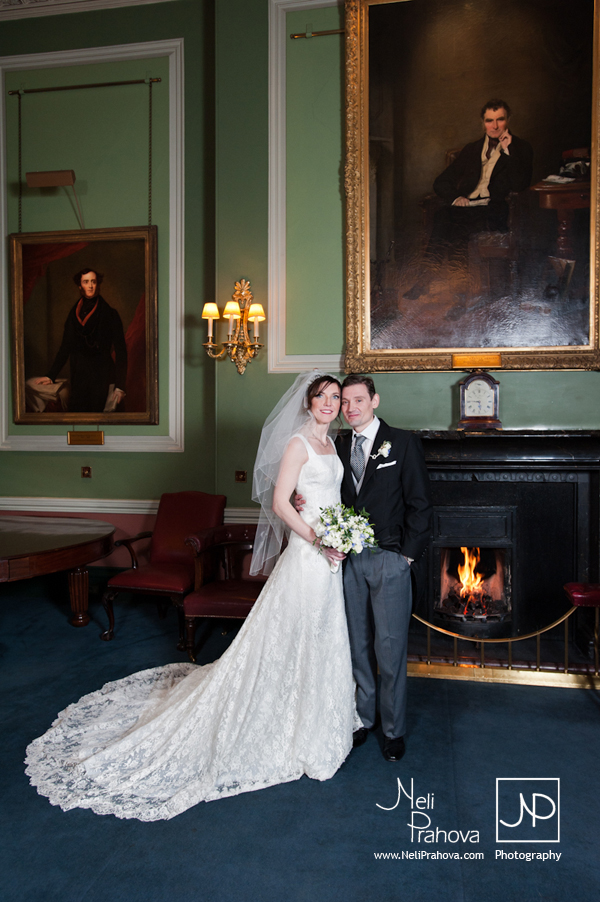
by Michael | Jan 20, 2015 | Blog
Most of the ceremonies I conduct are reasonably conventional (although all are personalised weddings, tailored to the couples or individuals concerned). Every so often I get asked for something a bit more way out.
Of course, “way out” means one thing to some people and something quite different to others. So perhaps it would be easier if I defined what I had in mind by the term “conventional”.
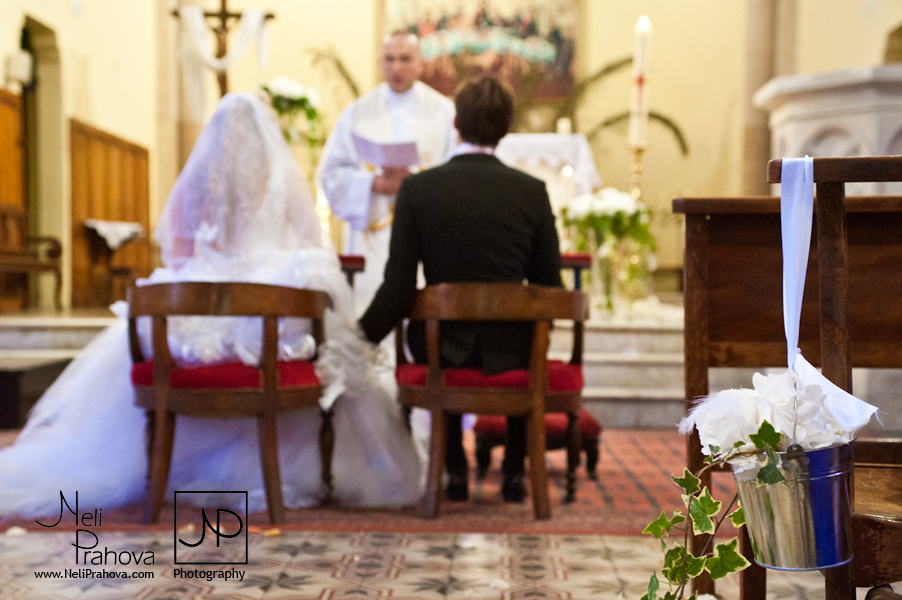
Conventional
A “conventional” wedding will contain most, if not all, of the following:
- an introduction or welcome;
- readings, sometimes delivered by friends or family – these can be prose or poetry, and can be chosen specially by the couple or suggested by the celebrant;
- music – this is unlikely to be “traditional” – although there’s nothing to stop people throwing in a hymn or the like. It may well reflect the couple’s personal preferences or a significant moment in their relationship;
- the vows – these may be written by the couple (with or without celebrant input) or simply suggested by the celebrant. They may be memorised or (more advisable!) read from a card or repeated after the celebrant;
- a ring blessing;
- a celebrant address – this may be something on the importance of marriage combined with the couple’s ‘story’ ;
- maybe, a ritual or two – for example, lighting a unity candle.
Such weddings may feature the bride in white; several, many or no religious elements; and a variety of choices of music and texts.
Venues can be just as varied, of course. Provided the legal part of the wedding has taken place (ie is registered), imagination or budget would seem to be the main limitations as to where you hold the ceremony.
More ‘way out’
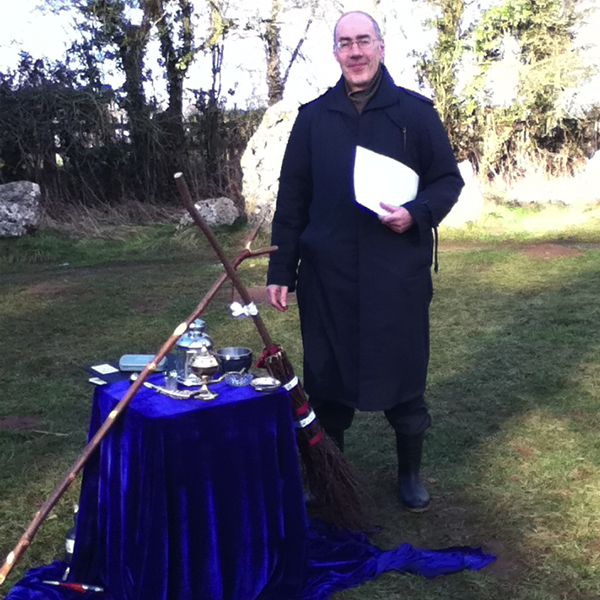
However, I am occasionally asked to do a couple of less middle-of-the-road ceremonies. One was a naturist wedding (I’m afraid, I have no photographs!) and, almost a year ago, a pagan wedding with a difference.
This wasn’t an ‘ordinary’ pagan wedding – if any can be thus termed – as the pagan was marrying a (half!) Jew, so elements from both cultures had to be combined (and explained to guests).
It was a handfasting ceremony, so that also set this apart.
The venue was certainly striking, as we were on top of Old Sarum, near Salisbury. This was of particular significance, as this iron age fort is very exposed, as the photo above shows – and we were holding the ceremony in January. January 2014 was a time of serious floods, as you may recall, and the chances of a dry wedding were very poor. However, whether it was due to the combination of cultures, or mere coincidence, the sun actually shone (briefly) on the ceremony, and all went – forgive the pun! – swimmingly.
So you have choices. Weigh them up and decide wisely. Bear in mind that a personalised wedding can be so special. Do give it consideration!
by Michael | Sep 9, 2014 | Blog
As a confirmed ‘dinosaur’, I’m a little wary about what I say that relates to 21st century weddings (or even 20th century ones?!), but I think the following tips may prove instructive.
Technology
Like it or not, smartphones and computers are part of the whole wedding process, so they must be factored in. Websites can help the couple with their organisation, aid communication with guests and enable sharing of photos after the ceremony.
However, not every couple will want photos plastered all over Facebook before they’ve even had a chance to look at their own pictures. They may not like the idea of outstretched arms all over the place taking photos on phones, when they have paid a photographer good money and don’t want to have arms blocking the shots. A well-considered sign at the entrance of the venue politely asking guests to refrain should be enough to deal with that issue.
The couple will surely not want ringers blaring out either. In that case, ask the celebrant to start off by requesting that mobile devices are turned to silent. If planned sufficiently well, the couple can even include a note in the invitation that they request a tech-free ceremony.
Having said that, there may be couples who actively encourage guests to share photos on social media from the word go, but, either way, it’s important to communicate your wishes in advance.
Incidentally, I still believe in a hand-written ‘thank you’ note after the event.
Unconventional ceremonies
Of course, traditionally, weddings used to be mostly religious, and many – though fewer – people still go down that route. However, increasing numbers are choosing a personalised civil ceremony. I believe that some of these can be the most beautiful and meaningful ceremonies, but, when you are a guest, they may not be your ‘cup of tea’.
If you have accepted an invitation, you presumably have an inkling of the style of the wedding. Even if you don’t, the fact that you have accepted to come means that you should not criticise or show displeasure. If that’s how the couple want to conduct their big day, then you should respect it. (And if you go with the flow, you may even acknowledge that the ceremony is not that bad after all!)
The same may apply to the décor, venue, music, rituals and readings. Accept and enjoy!
Gifts
Wedding lists (or registries) are a useful way of ensuring the couple receive what they want by way of gifts. You can go online, once you’ve received the link from the couple, and order whatever you choose, and this item is then automatically unavailable to anyone else.
If it’s an older couple who are marrying, they may already have all that they need. However, they may be happy to receive money. Some financial institutions offer mobile cheque deposit through their banking app. (That way, the couple may be able to pay for wedding outgoings without having to over-extend themselves.)
Nowadays some people will be looking for contributions to their honeymoon fund.
Reducing expense
Incidentally, by using a rewards card for those expenses or even the honeymoon, the couple may get back quite a lot of money – or value – which is a good bonus.
Major milestones are not being celebrated as they were fifty – or even twenty – years ago. Even ‘dinosaurs’ need to adapt to the times and use technology for everybody’s benefit – while always acknowledging the continuing need for dignity and respect at these big occasions.
Michael Gordon can help prepare and conduct a tailor-made civil ceremony in or around London or, indeed, in Europe.
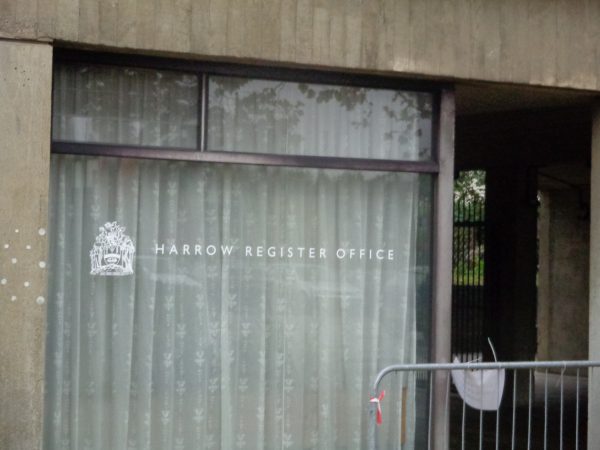
by Michael | Aug 19, 2014 | Blog
What do I mean by the “best” ceremony?
Of course, no such thing exists. However, there are definitely ceremonies that will meet your needs and expectations better than others. If you have the choice – and a lot of people don’t realise there actually is choice out there – are you happy with the standard ceremony offered by your religious institution or by the Registry Office? Or might you prefer something tailor-made, that reflects your personal beliefs and desires?
Let’s look at the options, so that you can make that decision more easily. I’m going to talk about weddings here, but a lot of my remarks will apply to other ceremonies (such as Vow renewals or even funerals). I am assuming, incidentally, that you are marrying for love, rather than for legal reasons!
The religious option
There are a number of advantages for marrying in your church/synagogue/temple etc. You will probably be comfortable if you have your familiar priest; your family may well approve; you yourself may be happy remaining within your cultural traditions. On a practical level, the religious and legal parts will be combined if it’s an Anglican ceremony.
I had a religious wedding (my choice), so I have nothing against it whatever – except that it is a standard ceremony (same size fits all).
The church etc. wedding is not for everybody. You may not be allowed a full religious wedding if you are “marrying out”. Or perhaps you are uncomfortable with a religious service, especially if you opted out long ago.
What else is open to you?
Registry Office

The Registry ceremony comes at the other extreme to a religious service. It is quick and simple, probably lasting less than 15 minutes. It smacks a little of a ‘conveyor-belt’, but such a ceremony will suit some people well enough.
Of course, the service is standardised. But the main disadvantage is that, if you want just a little religion or ritual (either because you don’t feel happy cutting yourself off culturally or even because you don’t want to upset family or friends), that option is simply not available.
The third option
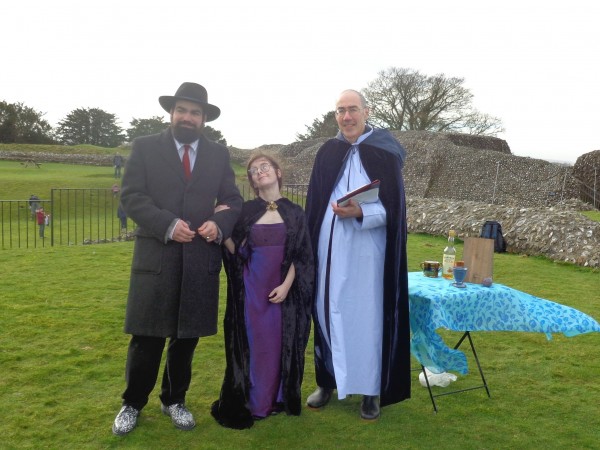
If you rule out the two choices mentioned above, you may be looking for a ceremony that appeals to you spiritually, personally and emotionally. A civil celebrant may offer what you are really looking for on your big day.
The service will be created for you in conjunction with your civil celebrant. (It will not cover the legal side, of course, but that is easily dealt with and your civil celebrant will be able to advise you).
Your ceremony will not be a standardised service, though it may contain many conventional elements, if you so choose. The point is that you are free to put in whatever readings, music or rituals you want (your celebrant will offer ideas) and choose whoever you want to participate.
This way, your ceremony can be a reflection of you both. It can be as romantic as you choose, and should be a memorable, meaningful experience that you – and your guests – will treasure long after the event itself.
So don’t go thinking that there’s no third option – there is. And it’s really viable. Just ask someone who knows!
Why not enjoy the “best” ceremony, after all!
Michael can help prepare and conduct a tailor-made civil ceremony in or around London or, indeed, Europe.
by Michael | Mar 18, 2014 | Blog
Last Sunday I was indoors, exhibiting at the Wedding Fair at Preston Cross Hotel, Great Bookham. Yet it was another glorious Spring day. I could have been in the garden or with my family in the countryside. But no.
For me it was the last wedding show of the season. For the second consecutive sunny Sunday, I spent four hours standing in a hall, trying to attract the interest of people who mostly had no idea why they should even want to speak to me.
As well as travel and time, I have to pay for my stand, so it’s not a cheap pastime (even if I sometimes gain by striking up partnerships with other splendid business-owners also exhibiting).
So why do I do it?
Relationships
Firstly, personal relationships are the life-blood of the wedding business. In an ideal world, if you are getting married, you want your ceremony to be absolutely perfect. If you’ve never met your celebrant before the day, there’s not much chance to build a rapport. That can affect your levels of stress and enjoyment.
And if you have met the officiant already, you need to be sure that you have confidence in, and are happy with, him/her (for the same reasons).
Spreading the Word
Secondly, most people have never heard of civil celebrants and don’t know what we can offer. I attend fairs because I want to increase awareness. Brides and grooms mostly have little idea that they can have a bespoke ceremony created for them and conducted by someone like me. They would really appreciate the freedom of choice, but simply don’t know that it’s out there. Just by being present, I can extend to them that choice, and answer some of their questions on the spot.
Meeting Each Other
Thirdly, let me stress again the importance of personal relationships. Better than my website, than my YouTube video, than my Facebook page, than my blogs is actually meeting people in the flesh. They have a chance, from the outset, to speak to me face-to-face and decide whether they even want to consider working with me. If they don’t like me, there’s no point them embarking on the process with me!
So I consider that wedding fairs are an important investment to make.
Of course, I now have to fill my time before the season restarts in September!
Good news
I’m delighted to report that I have some bookings to sustain me. Next week alone, I have the contrasting ceremonies of a funeral and a Vow Renewal to conduct. I’m particularly looking forward to the latter, as it’s a bishop and his wife who are renewing their vows in a Mayfair hotel after 20 years’ marriage. Should be such a joyous event!
Michael Gordon can help prepare and conduct a tailor-made life-cycle civil ceremony in or around London or, indeed, in Europe.
by Michael | Feb 25, 2014 | Blog
Everyone concerned wants an enjoyable and successful wedding, but I know, as a celebrant, that achieving this can sometimes prove to be less than simple. What if you are a wedding guest? Well, you know, you can contribute massively. Here’s how.
RSVP
If everybody leaves it late (or even fails) to respond to the invitation, that will cause enormous problems for those organising all the arrangements. Be one of those who responds as soon as possible.
Participating
If you have the honour of being invited to participate in the ceremony, then do make sure you find out well in advance what the expectations are of your role! You may be expected to attend a rehearsal the day or morning before or wear particular attire. It’s far better to check beforehand than cause ripples and embarrassment on the day.
Tweaking The Invitation
You may want to bring your child(ren), but if there is no mention of them on the invitation, then accept it. (It’s not meant as a snub, but there simply have to be limits on the numbers invited.) Obviously, the same goes for other people you may feel should be invited.
Punctuality
Arrive well (30 minutes?) in advance – and don’t upstage the bride by a tardy, flustered entry. If you have been delayed, then you should simply wait until the end of the ceremony – just don’t interrupt it.
Dress
You will normally be given guidelines in the invitation. Go with what you are asked to wear, even if you might prefer a different style of attire.
At the Ceremony
Ushers should show you to your seat. If that’s not the case, leave the front two rows free for the family and VIPs.
Photography/Filming
There will probably be an official photographer in attendance and his/her photos will matter a lot to the couple. It would be far better if they could show your smiling face rather than an iPhone held in the air. Take photos after the ceremony, by all means, and always respect any requests in this regard in the invitation.
Behaviour
It should go without saying that you ought to drink responsibly afterwards (and especially beforehand!). Likewise, don’t trash the venue or embarrass yourself or the couple by loud or aggressive behaviour.
This is the biggest day in your friends’/relatives’ lives, so be grateful that they have chosen to include you. Enjoy the day – and enhance it for the happy couple. Make them glad they invited you!





